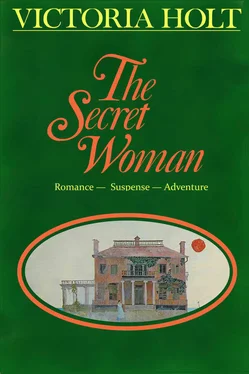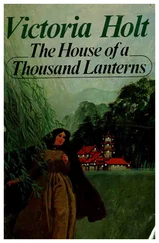Victoria Holt - The Secret Woman
Здесь есть возможность читать онлайн «Victoria Holt - The Secret Woman» весь текст электронной книги совершенно бесплатно (целиком полную версию без сокращений). В некоторых случаях можно слушать аудио, скачать через торрент в формате fb2 и присутствует краткое содержание. Год выпуска: 1970, Издательство: Doubleday, Жанр: Исторические любовные романы, на английском языке. Описание произведения, (предисловие) а так же отзывы посетителей доступны на портале библиотеки ЛибКат.
- Название:The Secret Woman
- Автор:
- Издательство:Doubleday
- Жанр:
- Год:1970
- ISBN:нет данных
- Рейтинг книги:3 / 5. Голосов: 1
-
Избранное:Добавить в избранное
- Отзывы:
-
Ваша оценка:
- 60
- 1
- 2
- 3
- 4
- 5
The Secret Woman: краткое содержание, описание и аннотация
Предлагаем к чтению аннотацию, описание, краткое содержание или предисловие (зависит от того, что написал сам автор книги «The Secret Woman»). Если вы не нашли необходимую информацию о книге — напишите в комментариях, мы постараемся отыскать её.
The Secret Woman — читать онлайн бесплатно полную книгу (весь текст) целиком
Ниже представлен текст книги, разбитый по страницам. Система сохранения места последней прочитанной страницы, позволяет с удобством читать онлайн бесплатно книгу «The Secret Woman», без необходимости каждый раз заново искать на чём Вы остановились. Поставьте закладку, и сможете в любой момент перейти на страницу, на которой закончили чтение.
Интервал:
Закладка:
“The ghosts of people who lived here are angry because Aunt Charlotte has made their home unrecognizable,” I told Ellen and Mrs. Buckle.
“Lord a’ mercy!” cried Mrs. Buckle.
Ellen said it wasn’t right to talk of such things.
But I insisted on talking. “One day,” I said, “the ghosts of the house will rise up and something fearful will happen.”
That was in the first months. Later my feelings toward Aunt Charlotte changed and although I could never love her, I respected her.
Practical in the extreme, down to earth, unromantic, she did not see the Queen’s House as I saw it. To her it was rooms within walls — ancient it was true and the sole virtue in this was that it made an appropriate setting for her pieces. There was only one room in the house which she allowed to keep its character and she had even come to this decision for business reasons. This was the room in which Queen Elizabeth was reputed to have slept. There was even the Elizabethan bed, reputed to be the bed itself; and as a concession to this legend — if legend it was — everything in the room was Tudor. It was for business, she said hurriedly. Many people came to see this room; it put them in the right “mood”; they were fascinated and because of this prepared to pay the price she asked.
I often went to that room and found some comfort there. I used to say to myself: “The past is on my side … against Aunt Charlotte. The ghosts feel my sympathy.” That was my fanciful notion. And during those months I needed sympathy.
I used to stand in that room and touch the bedposts and think of the famous Tilbury speech which my father had often quoted to me. “I know I have the body of a weak, feeble woman; but I have the heart and stomach of a king — and of a king of England too …” And then I was as certain that I would come through this unhappy period as she had been of victory over the Spaniards.
So it was understandable that the house offered me compensation and I began to feel that it was alive. I became familiar with its night noises — the sudden inexplicable creak of a floorboard, the rattle of a window, and how when the wind moaned through the branches of the chestnut tree it sounded like whispering voices.
There were days when Aunt Charlotte went away to buy. She would visit sales at old houses sometimes quite far away and after she returned we would be more cluttered than ever. Aunt Charlotte had a shop in the center of the town and there she displayed certain pieces but most of the goods were in the house and strangers were constantly visiting us.
Miss Beringer spent all her time at the shop to allow Aunt Charlotte to absent herself, but Aunt Charlotte said the woman was a fool and had little appreciation of values. That was not true; it merely meant that Miss Beringer lacked Aunt Charlotte’s knowledge. But Aunt Charlotte was so efficient herself that she thought most people fools.
For at least a year I was what Aunt Charlotte would call “a cross,” in other words a burden; but that changed suddenly. It was a table which caught my attention. I was suddenly excited merely to look at it and I was crouching on the floor examining the carvings on the legs when Aunt Charlotte discovered me. She squatted on the floor beside me.
“Rather a fine example,” she said gruffly.
“It’s French, isn’t it?” I asked.
Her lips turned up at the corners which was as near to a smile as she could get.
She nodded. “It’s unsigned but I believe it’s the work of René Dubois. I thought at first his father Jacques was responsible for it, but I fancy it’s a year or two later. That green and gold lacquer on the oak carcase, you see! And look at those bronze mounts.”
I looked and found myself touching it reverently.
“It would be the end of the eighteenth century,” I hazarded.
“No, no.” She shook her head impatiently. “Fifty years early. Mid-eighteenth century.”
After that our relationship changed. She would sometimes call me and say: “Here! What do you think of this? What do you notice about it?” At first I felt a certain desire to score over her, to show her that I knew something about her precious goods; but later it became a great interest to me and I began to understand the difference between the furniture of various countries and to recognize period by certain features.
One day Aunt Charlotte went so far as to admit: “You know as much as that fool Beringer.” But that was when she was particularly incensed by that long suffering lady.
But as far as I was concerned the Queen’s House took on a new fascination. I began to know certain pieces, to regard them as old friends. Mrs. Buckle dusting with deft but careful hands said: “Here, are you going to be another Miss Charlotte Brett, Miss Anna?”
That startled me; I felt then as though I wanted to run away.
It was one morning in the middle of the summer holidays, about four years after my parents had brought me to England, when Ellen came to my room and told me that Aunt Charlotte wished to see me at once. Ellen looked scared and I asked if anything was wrong.
“I’ve not been told, miss,” said Ellen, but I was aware that she knew something.
I made my way — one made one’s way in the Queen’s House — to Aunt Charlotte’s sitting room.
There she was, seated with papers before her, for she used the place as her office. Her desk on that day was a sturdy refectory table — sixteenth-century English, of a type that owed its charm to its age rather than its beauty. She sat very upright on a rather heavy chair of the Yorkshire-Derbyshire type of carved and turned oak, of much later period than the table, but as strong and sturdy. She chose these strong pieces for use while they were in the house. The rest of the office did not match the table and chair. An exquisite piece of tapestry hung on the wall. I knew it to be of the Flemish school, and guessed it would not be there for long; and crowded together were heavy oak pieces from Germany side by side with a delicate French eighteenth-century commode and two pieces in the Boulle tradition. I noticed the change in myself. I could sum up the contents of a room, date them and note their qualities even while I was eager to know what this summons meant.
“Sit down,” said Aunt Charlotte, and her expression was more grim than usual.
I sat and she went on in her brusque way. “Your mother is dead. It was cholera.”
How like her to shatter my future with two brief sentences. The thought of reunion had been like a lifebelt, which had prevented my being submerged in the misery of my loneliness. And she said it calmly like that. Dead … of cholera.
She looked at me fearfully; she hated any display of emotion.
“Go to your room. I’ll send Ellen up with some hot milk.”
Hot milk! Did she think that could console me?
“I’ve no doubt,” she said, “your father will be writing to you. He will have made arrangements.”
I hated her then, which was wrong for she was breaking the news in the only way she considered possible. She was offering me hot milk and my father’s arrangements to console me for the loss of my beloved mother.
2
My father did write to me. We shared our grief, he said; he would not dwell on that. The death of his beloved wife and my dear mother had meant his making great changes. He was thankful that I was in the hands of his dear sister, my Aunt Charlotte, on whose good sense and great virtue he relied. It was a great comfort to him to know that I was in such hands. He trusted I was suitably grateful. He thought he would be leaving India shortly. He had asked to be transferred and he had good friends at the War Office. He had received the utmost sympathy and as there was trouble brewing in other parts of the world, he believed that very soon he would be doing his duty in another field.
Читать дальшеИнтервал:
Закладка:
Похожие книги на «The Secret Woman»
Представляем Вашему вниманию похожие книги на «The Secret Woman» списком для выбора. Мы отобрали схожую по названию и смыслу литературу в надежде предоставить читателям больше вариантов отыскать новые, интересные, ещё непрочитанные произведения.
Обсуждение, отзывы о книге «The Secret Woman» и просто собственные мнения читателей. Оставьте ваши комментарии, напишите, что Вы думаете о произведении, его смысле или главных героях. Укажите что конкретно понравилось, а что нет, и почему Вы так считаете.












